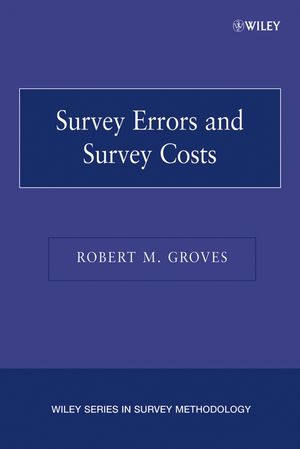Survey Errors and Survey CostsISBN: 978-0-471-67851-9
Paperback
590 pages
April 2004
 This is a Print-on-Demand title. It will be printed specifically to fill your order. Please allow an additional 10-15 days delivery time. The book is not returnable.
|
||||||
1.1 Diverse Perspectives on Survey Research.
1.2 The Themes of Integration: Errors and Costs.
1.3 The Languages of Error.
1.4 Classifications of Error Within Survey Statistics.
1.5 Terminology of Errors in Psychological Measurement.
1.6 The Language of Errors in Econometrics.
1.7 Debates About Inferential Errors.
1.8 Important features of language Differences.
1.9 Summary: The Tyranny of the Measurable.
1.10 Summary and Plan of This Book.
2. An Introduction to Survey Costs.
2.1 Rationale for a Joint Concern About Costs and Errors.
2.2 Use of Cost and Error Models in Sample Design.
2.3 Criticisms of Cost-Error Modeling to Guide Survey Decisions.
2.4 Nonlinear Cost Models Often Apply to Practical Survey Administration.
2.5 Survey Cost Models are Inherently Discontinuous.
2.6 Cost Models Often Have Stochastic Features.
2.7 Domains of Applicability of Cost Models Must Be Specified.
2.8 Simulation Studies Might Be Best Suited to Design Decisions.
2.9 Is Time Money?
2.10 Summary: Cost Models and Survey Errors.
3. Costs and Errors of Covering the Population.
3.1 Definitions of Populations Relevant to the Survey.
3.2 Coverage Error in Descriptive Statistics.
3.3 An Approach to Coverage Error in Analytic Statistics.
3.4 Components of Coverage Error.
3.5 Coverage Problems with the Target Population of Households.
3.6 Measurement of and Adjustments for Noncoverage Error.
3.7 Survey Cost Issues Involving Coverage Error.
3.8 Summary.
4. Nonresponse in Sample Surveys.
4.1 Nonresponse Rates.
4.2 Response Rate Calculation.
4.3 Temporal Change in Response Rates.
4.4 Item Missing Data.
4.5 Statistical Treatment of Nonresponse in Surveys.
4.6 Summary.
5. Probing the Causes of Nonresponse and Efforts to Reduce Nonresponse.
5.1 Empricial Correlates of Survey Participation.
5.2 Efforts by Survey Methodologists to Reduce Refusals.
5.3 Sociological Concepts Relevant to Survey Nonresponse.
5.4 Psychological Attributes of Nonrespondents.
5.5 Summary.
6. Costs and Errors Arising from Sampling.
6.1 Introduction.
6.2 The nature of Sampling Error.
6.3 Measuring Sampling Error.
6.4 Four Effects of the Design on Sampling Error.
6.5 The Effect of Nonsampling Errors on Sampling Error Estimates.
6.6 Measuring Sampling Errors on Sample Means and Proportions from Complex Samples.
6.7 The Debate on Reflecting the Sample Design in Estimating Analytic Statistics.
6.8 Reflecting the Sample Design When Estimating Complex Statistics.
6.9 Summary.
7. Empirical Estimation of Survey Measurement Error.
7.1 A First Estimation of Observational Errors Versus Errors of Nonobservation.
7.2 Laboratory Experiments Resembling the Survey Interview.
7.3 Measures External to the Survey.
7.4 Randomized Assignment of Measurement Procedures to Sample Persons.
7.5 Repeated measurements of the Same Persons.
7.6 Summary of Individual Techniques of Measurement Errors Estimation.
7.7 Combinations of Design Features.
7.8 Summary.
8. The Interviewer as a Source of Survey Measurement Error.
8.1 Alternative Views on the Role of the Observer.
8.2 The Roles of the Survey Interviewer.
8.3 Designs for Measuring Interview Variance.
8.4 Interviewer Effects in Personal Interview Surveys.
8.5 Interviewer Effects in Centralized Telephone Surveys.
8.6 Explaining the Magnitude of Interviewer Effects.
8.7 Summary of Research on Interviewer Variance.
8.8 Measurement of Interviewer Compliance With Training Guidelines.
8.9 Experiments in Manipulating Interviewer Behavior.
8.10 Social Psychological and Sociological Explanations for Response Error Associated with Interviewers.
8.11 Summary.
9. The Respondent as a Source of Measurement Error.
9.1 Components of Response Formation Process.
9.2 The Encoding Process and the Absence of Knowledge Relevant to the Survey Question.
9.3 Comprehension of the Survey Question.
9.4 Retrieval of Information from Memory.
9.5 Judgment of Appropriate Answer.
9.6 Communication of Response.
9.7 Sociological and Demographic Correlates of Respondent Error.
9.8 Summary.
10. Measurement Errors Associated with the Questionnaire.
101 Properties of Words in Questions.
10.2 Properties of Question Structure.
10.3 Properties of Question Order.
10.4 Conclusions About Measurement Error Related to the Questionnaire.
10.5 Estimates of Measurement Error from Multiple Indicator Models.
10.6 Cost Models Associated with Measurement Error Through the Questionnaire.
10.7 Summary.
11. Response Effects of the Mode of Data Collection.
11.1 Two Very Different Questions About Mode of Data Collection.
11.2 Properties of Media of Communication.
11.3 Applying Theories of Mediated Communication to Survey Research.
11.4 Findings from the Telephone Survey Literature.
11.5 Interaction Effects of Mode and Other Design.
11.6 Survey Costs and the Mode of Data Collection.
11.7 Cost and Error Modeling with Telephone and Face to Face Surveys.
11.8 Summary.
References.
Index.



